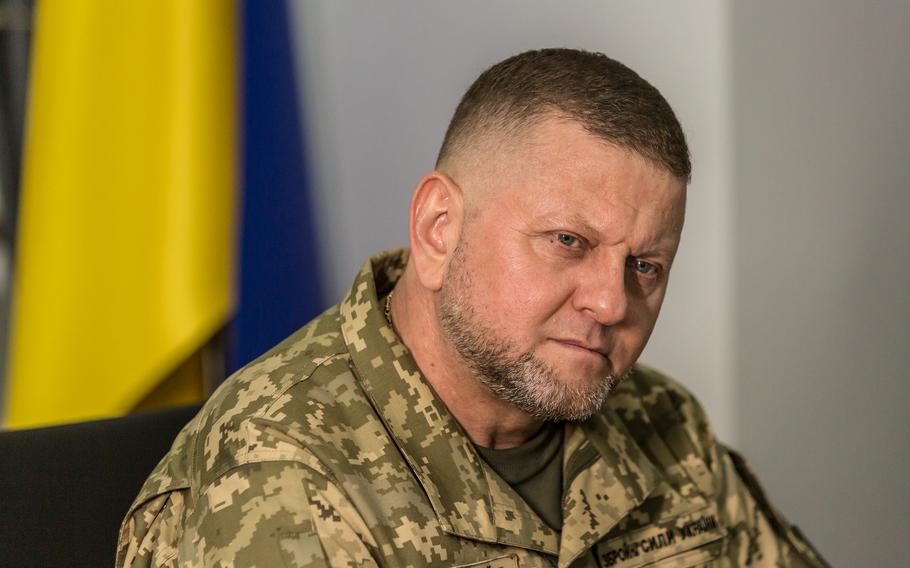Europe
Former Ukraine military head appointed to UK ambassador role
The Washington Post March 7, 2024

Gen. Valery Zaluzhny, seen in Kyiv on June 28, has been appointed as Ukraine’s ambassador to Britain. (Oksana Parafeniuk/The Washington Post)
KYIV — President Volodymyr Zelenskyy on Thursday appointed his former military chief, Gen. Valery Zaluzhny, to become Ukraine’s ambassador to Britain — a next step outside of the military for Zaluzhny a month after he was replaced.
Zaluzhny was offered the post last month but didn’t immediately accept, according to a person familiar with the matter who spoke on the condition of anonymity.
The appointment will be viewed as a resolution between Zelenskyy and Zaluzhny after reports that they had a strained relationship, in part because Zelenskyy was suspicious of Zaluzhny’s political ambitions. Zaluzhny, 50, remains extremely popular in Ukraine, rivaling the president, and this move keeps him in an influential role but as a diplomat outside the country.
Zaluzhny “told me that this is the direction he would like to take — diplomacy,” Zelenskyy said in a post on the Telegram social media app. “Our alliance with Britain should only get stronger.”
Ukraine’s ambassadorship to Britain — a critical posting as London has taken a leading role in supplying weaponry to Ukraine — had been vacant since July, when Zelenskyy removed Vadym Prystaiko. Prystaiko, an experienced diplomat, had criticized Zelenskyy’s “unhealthy sarcasm” during a television appearance.
Zaluzhny’s role as commander in chief involved some diplomacy — he often directly lobbied his foreign military counterparts for more weapons so they could convince their governments. He is likely to be doing some of the same in London, but after two years of commanding Ukraine’s war effort, Zaluzhny will be in a civilian posting and removed from any battlefield decision-making.
Zaluzhny was dismissed last month and replaced by Col. Gen. Oleksandr Syrsky, who had been Ukraine’s ground forces commander, in part because Zelenskyy felt that new leadership could rejuvenate the military after the fighting had reached a stalemate over the past year. But the move was unpopular with rank-and-file soldiers, many of whom respected Zaluzhny.
Syrsky has had a difficult first month on the job, ordering troops to withdraw from the eastern Ukrainian city of Avdiivka three weeks ago. Ukraine is also facing ammunition shortages as a $60 billion security assistance package from the United States has stalled in Congress.
Amid uncertainty in Washington, the job of securing British support has heightened importance. Though Britain provides less materiel than Washington does, it has often taken the lead in what kind of weapons it approves. For example, Britain sent Kyiv long-range missiles, its Storm Shadow cruise missiles, while the Biden administration was still denying Kyiv its Army Tactical Missile System, or ATACMS.
Meanwhile, French President Emmanuel Macron has in recent days escalated his rhetoric regarding the West’s responsibility to help Ukraine defeat Russia.
On Thursday, he met in Paris with parliamentary party leaders, who said Macron reaffirmed his position that there should be “no limits” in support for Ukraine.
His comments followed an announcement late last month that France currently has “no consensus” on sending ground troops to Ukraine but that “nothing should be excluded.”
While visiting Prague on Tuesday, he then urged Ukraine’s allies to not be “cowards.”
Fabien Roussel, leader of the French Communist Party, summarized the Thursday meeting to reporters, saying Macron told attendees that “there should no longer be, according to his analysis, any limits to France’s intervention or that of the countries of the E.U.” when it comes to supporting Ukraine.
The declaration, Roussel asserted, suggests that France no longer believes in the power of diplomacy or politics to stop the war. This represents a shift in position, he said, from two years ago when there were “red lines.”
Macron’s remarks demonstrate that he “is prepared tomorrow to engage in an escalation of war that could become very dangerous,” Roussel said.
Marine Tondelier, of France’s Greens, said it is “extremely worrying” to see the French president say, when referring to a war involving a nuclear-armed leader, “that we must show we are without limits.”
Kremlin spokesman Dmitry Peskov told Russian state TV on Thursday that Macron “continues to raise the level of France’s direct involvement in this war.”